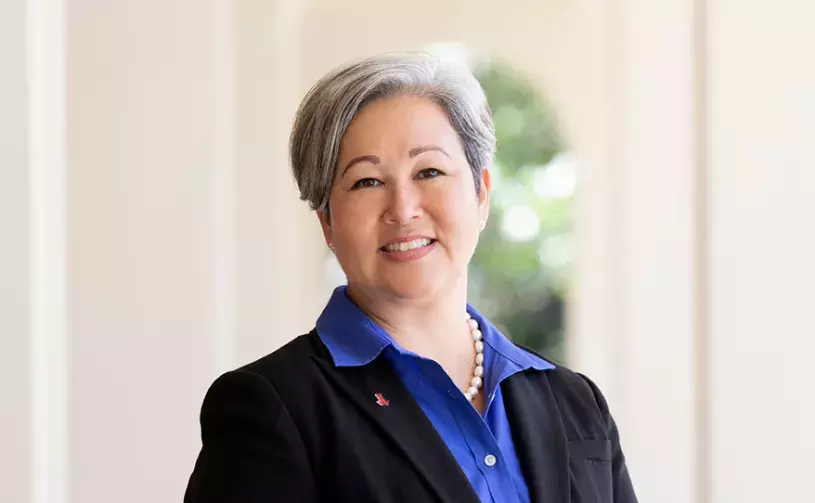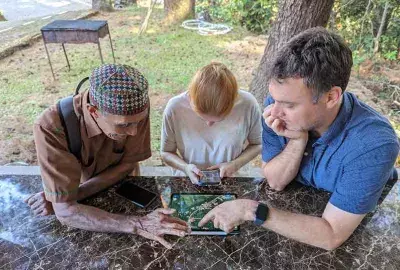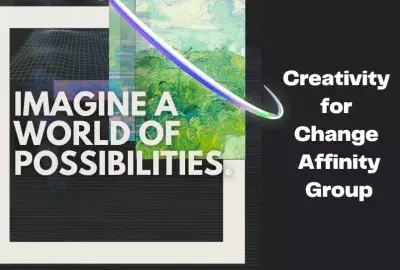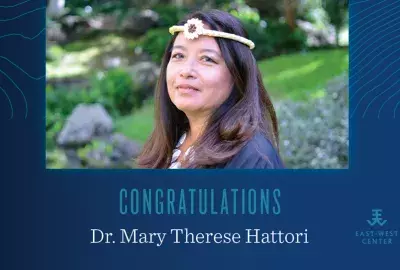Error message

OFFICE/DEPARTMENT
This article was originally published by the Honolulu Star-Advertiser on February 3, 2023. Reprinted by permission.
The East-West Center successfully sought an increase in funding, effective this year. Does this reflect growing national appreciation?
Yes, I do believe our $2.3 million increase in congressional funding reflects a growing appreciation for the East-West Center’s value to the nation and the Indo-Pacific region, as well as enhanced strategic focus on the region itself.
It helps that EWC is able to provide taxpayers with added value by bringing in grants, contracts and contributions that substantially amplify impacts of our federal appropriation. This allows us to run programs like a joint reporting project between Indian and Pakistani journalists, who would never have the opportunity to interact otherwise, or providing training and seed money for young environmental and social entrepreneurs in Southeast Asia. And, of course, graduate programs for nearly 400 students from 48 countries and 20 different US states who reside together on our campus. We offered 190 programs in 2022, reaching more than 35,000 people worldwide.
It’s always been our belief that by offering multinational programs that support shared human values such as freedom of expression, peaceful resolution of conflict and care for the environment, the center reflects — and projects — our society’s highest ideals. Our aim is to promote peace and prosperity across the Indo-Pacific region, and that benefits everyone, including the US.
In August, EWC released its five-year Strategic Plan for 2023 through 2027, with five priorities: developing and equipping leaders; convening impactful dialogues; partnering with the Pacific islands; fostering environmental solutions; and supporting good governance. Tell us more.
When I embarked on this exciting journey, I was given clear guidance from the center’s Board of Governors: design a relevant strategy; diversify the center’s sources of funding; improve operations; and elevate the center’s status. A key step was building the center’s new strategic plan, our first since 2005.
Staff working groups are now finalizing plans to realign center programs, structure, budget and processes under these key pillars.
On Feb. 19, EWC plans a celebration dinner to honor US Sen. Brian Schatz with its Asia Pacific Community Building Award. The center recognized US Sen. Mazie Hirono with an inaugural Women of Courage award. And US Rep. Ed Case has expressed strong support for the EWC mission. How do EWC goals and those of Hawai‘i’s federal representatives align?
I think Hawai‘i’s congressional delegates have been supportive of the center because they understand the critical importance of investing in leaders who can help to solve the region’s challenges, embodied by our more than 68,000 distinguished alumni around the world — including the new prime minister of New Zealand, Chris Hipkins, who participated in a study tour for young regional leaders in 2012.
Sen. Schatz worked with East-West Center experts on climate and environment issues long before he went to Washington, and Rep. Case conferred with center specialists while formulating BLUE Pacific legislation he has championed to boost US engagement in the Pacific islands. Sen. Hirono frequently meets with EWC participants in Hawai‘i and Washington, DC We look forward to interacting with US Rep. Jill Tokuda.
In recent months, your administration became aware that a substantial number of students, many of whom rely on scholarship stipends, were struggling as inflation brought higher costs. The center community responded, starting a food donation program and emergency fund, among other measures — but the predicament raises the issue of access to education for students in the Pacific and other remote areas. There is also growing competition from China in the education space. Does the scholarship/grant structure play a part?
Food and income insecurity among graduate students is not a problem unique to the East-West Center; but for many EWC participants, who may be half a world away from home, the situation can be especially acute. Thankfully, the EWC community’s response has been phenomenal. On the administration side, we have been able to increase our stipends for center-funded students and are working with our scholarship partners to do the same.
There is certainly a recognition across the scholarship community that rising living costs in the US are affecting current and prospective students. We’d love to see scholarships grow substantially, since we know how important these educational opportunities are. And we are working toward this in every way we can.
How can Hawai‘i residents support the East-West Center?
For me, the most wonderful thing about being part of the East-West Center is the powerful sense of ‘ohana. If anyone reading this is interested in getting involved with the center’s vibrant international residents, please consider joining our student-support organization Friends of the East-West Center. Volunteer members offer EWC participants a bridge to local families and culture.
This article was originally published by the Honolulu Star-Advertiser on February 3, 2023. Reprinted by permission.
The East-West Center successfully sought an increase in funding, effective this year. Does this reflect growing national appreciation?
Yes, I do believe our $2.3 million increase in congressional funding reflects a growing appreciation for the East-West Center’s value to the nation and the Indo-Pacific region, as well as enhanced strategic focus on the region itself.
It helps that EWC is able to provide taxpayers with added value by bringing in grants, contracts and contributions that substantially amplify impacts of our federal appropriation. This allows us to run programs like a joint reporting project between Indian and Pakistani journalists, who would never have the opportunity to interact otherwise, or providing training and seed money for young environmental and social entrepreneurs in Southeast Asia. And, of course, graduate programs for nearly 400 students from 48 countries and 20 different US states who reside together on our campus. We offered 190 programs in 2022, reaching more than 35,000 people worldwide.
It’s always been our belief that by offering multinational programs that support shared human values such as freedom of expression, peaceful resolution of conflict and care for the environment, the center reflects — and projects — our society’s highest ideals. Our aim is to promote peace and prosperity across the Indo-Pacific region, and that benefits everyone, including the US.
In August, EWC released its five-year Strategic Plan for 2023 through 2027, with five priorities: developing and equipping leaders; convening impactful dialogues; partnering with the Pacific islands; fostering environmental solutions; and supporting good governance. Tell us more.
When I embarked on this exciting journey, I was given clear guidance from the center’s Board of Governors: design a relevant strategy; diversify the center’s sources of funding; improve operations; and elevate the center’s status. A key step was building the center’s new strategic plan, our first since 2005.
Staff working groups are now finalizing plans to realign center programs, structure, budget and processes under these key pillars.
On Feb. 19, EWC plans a celebration dinner to honor US Sen. Brian Schatz with its Asia Pacific Community Building Award. The center recognized US Sen. Mazie Hirono with an inaugural Women of Courage award. And US Rep. Ed Case has expressed strong support for the EWC mission. How do EWC goals and those of Hawai‘i’s federal representatives align?
I think Hawai‘i’s congressional delegates have been supportive of the center because they understand the critical importance of investing in leaders who can help to solve the region’s challenges, embodied by our more than 68,000 distinguished alumni around the world — including the new prime minister of New Zealand, Chris Hipkins, who participated in a study tour for young regional leaders in 2012.
Sen. Schatz worked with East-West Center experts on climate and environment issues long before he went to Washington, and Rep. Case conferred with center specialists while formulating BLUE Pacific legislation he has championed to boost US engagement in the Pacific islands. Sen. Hirono frequently meets with EWC participants in Hawai‘i and Washington, DC We look forward to interacting with US Rep. Jill Tokuda.
In recent months, your administration became aware that a substantial number of students, many of whom rely on scholarship stipends, were struggling as inflation brought higher costs. The center community responded, starting a food donation program and emergency fund, among other measures — but the predicament raises the issue of access to education for students in the Pacific and other remote areas. There is also growing competition from China in the education space. Does the scholarship/grant structure play a part?
Food and income insecurity among graduate students is not a problem unique to the East-West Center; but for many EWC participants, who may be half a world away from home, the situation can be especially acute. Thankfully, the EWC community’s response has been phenomenal. On the administration side, we have been able to increase our stipends for center-funded students and are working with our scholarship partners to do the same.
There is certainly a recognition across the scholarship community that rising living costs in the US are affecting current and prospective students. We’d love to see scholarships grow substantially, since we know how important these educational opportunities are. And we are working toward this in every way we can.
How can Hawai‘i residents support the East-West Center?
For me, the most wonderful thing about being part of the East-West Center is the powerful sense of ‘ohana. If anyone reading this is interested in getting involved with the center’s vibrant international residents, please consider joining our student-support organization Friends of the East-West Center. Volunteer members offer EWC participants a bridge to local families and culture.







